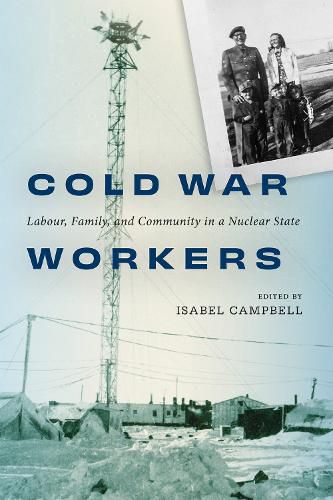Readings Newsletter
Become a Readings Member to make your shopping experience even easier.
Sign in or sign up for free!
You’re not far away from qualifying for FREE standard shipping within Australia
You’ve qualified for FREE standard shipping within Australia
The cart is loading…






When Canada sought to protect its borders and aid its allies during the Cold War, many people were recruited to build the emerging security state: as construction and maintenance workers, engineers, members of the armed forces, medical researchers, and research subjects. Security work transformed the lives of individuals, families, and communities in ways that were both predictable and surprising, and both beneficial and harmful; the militarization and colonization of Indigenous lives and lands was especially disruptive.
The opening essays of Cold War Workers intimately portray the complicated effects of Cold War labour upon Indigenous lives. Elmer Sinclair, a residential school survivor and member of the Canadian Armed Forces, achieved equality with white men through his militarized masculinity. His more positive professional experience contrasts with those of Indigenous workers on northern radar lines, many of whom lost languages, connections to the land, and other elements of traditional cultures as they sought new skills and better employment. Diverse Indigenous experiences of Cold War security work set the scene for the second set of essays, which explore the impact of security preoccupations on marginalized groups - the study of extreme isolation through scientific experimentation on human subjects; the targeting of gay men with psychiatric labelling to enforce an idealized masculinity; and the restriction of gender mobility in the Canadian military, and the pushback from servicewomen.
Cold War Workers raises questions about the influence of settler-colonial masculine institutional values on those who laboured for the Cold War state and society. By comparing the experiences of different types of workers, families, and communities, this volume reveals how race, gender, and privilege affected people in varied and sometimes unexpected ways.
$9.00 standard shipping within Australia
FREE standard shipping within Australia for orders over $100.00
Express & International shipping calculated at checkout
When Canada sought to protect its borders and aid its allies during the Cold War, many people were recruited to build the emerging security state: as construction and maintenance workers, engineers, members of the armed forces, medical researchers, and research subjects. Security work transformed the lives of individuals, families, and communities in ways that were both predictable and surprising, and both beneficial and harmful; the militarization and colonization of Indigenous lives and lands was especially disruptive.
The opening essays of Cold War Workers intimately portray the complicated effects of Cold War labour upon Indigenous lives. Elmer Sinclair, a residential school survivor and member of the Canadian Armed Forces, achieved equality with white men through his militarized masculinity. His more positive professional experience contrasts with those of Indigenous workers on northern radar lines, many of whom lost languages, connections to the land, and other elements of traditional cultures as they sought new skills and better employment. Diverse Indigenous experiences of Cold War security work set the scene for the second set of essays, which explore the impact of security preoccupations on marginalized groups - the study of extreme isolation through scientific experimentation on human subjects; the targeting of gay men with psychiatric labelling to enforce an idealized masculinity; and the restriction of gender mobility in the Canadian military, and the pushback from servicewomen.
Cold War Workers raises questions about the influence of settler-colonial masculine institutional values on those who laboured for the Cold War state and society. By comparing the experiences of different types of workers, families, and communities, this volume reveals how race, gender, and privilege affected people in varied and sometimes unexpected ways.